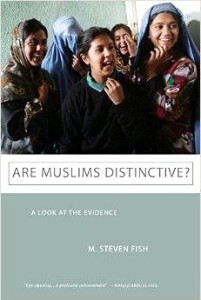|
by Civilisation 3000
“Is Islam violent? I would say absolutely not,” Steven Fish said in an interview,
Professor M. Steven Fish, a political scientist at the University of California, Berkeley, studies democracy and regime change in developing and post-communist countries, religion and politics, and constitutional systems and national legislatures. He is the author of Are Muslims Distinctive? A Look at the Evidence (Oxford, 2011), which was selected for Choice‘s Outstanding AcademicTitles in 2012: Top 25 Books.
It is the first major scientific effort to assess how Muslims and non-Muslims differ–and do not differ–in the contemporary world.
 In this book, he seeks to quantify the correlation between Islam and violence and found that murder rates are substantially lower in Muslim-majority countries and instances of political violence are no more frequent. Using rigorous methods and data drawn from around the globe, it reveals that in some areas Muslims and non-Muslims differ less than is commonly imagined, and shows that Muslims are not unusually religious or inclined to favour the fusion of religious and political authority. In this book, he seeks to quantify the correlation between Islam and violence and found that murder rates are substantially lower in Muslim-majority countries and instances of political violence are no more frequent. Using rigorous methods and data drawn from around the globe, it reveals that in some areas Muslims and non-Muslims differ less than is commonly imagined, and shows that Muslims are not unusually religious or inclined to favour the fusion of religious and political authority.
Zack Beauchamp (Brown University and the LSE], pilloried by American rightwingers as an anti-semitic leftist hipster, quotes from the book:
“Predominantly, Muslim countries average 2.4 murders per annum per 100,000 people, compared to 7.5 in non-Muslim countries. The percentage of the society that is made up of Muslims is an extraordinarily good predictor of a country’s murder rate. More authoritarianism in Muslim countries does not account for the difference. I have found that controlling for political regime in statistical analysis does not change the findings. More Muslims, less homicide”.
Fish further fleshed out these findings, for example by re-running the numbers to exclude non-Muslim-majority states with extraordinarily high murder rates (Colombia, El Salvador, Guatemala, Honduras, Jamaica, Lesotho, South Africa, and Venezuela). Countries with lots of Muslims were still less murder prone by a pretty large margin.
Turning to the Google Books extracts, differences are noted:
- gender inequality is more severe among Muslims,
- Muslims are intolerant of homosexuality
- and democracy is rare in the Muslim world.
Other areas of divergence give Muslims the advantage:
- less violent crime
- lower class-based inequities
Professor Fish’s research findings have vital implications for human welfare, interfaith understanding, and the foreign policies of the United States and other Western countries.
As Seumas Milne in the Guardian put it:
“The perpetrators of one attack after another, from London 2005 to Boston 2013, say they’re carrying them out in retaliation for the vastly larger scale US and British killing in the Muslim world”.
–
Extracts from Are Muslims Distinctive? may be seen here and a more recent article in the Washington Post by Professor Fish here.
Copyright Civilisation 3000, 2015
|